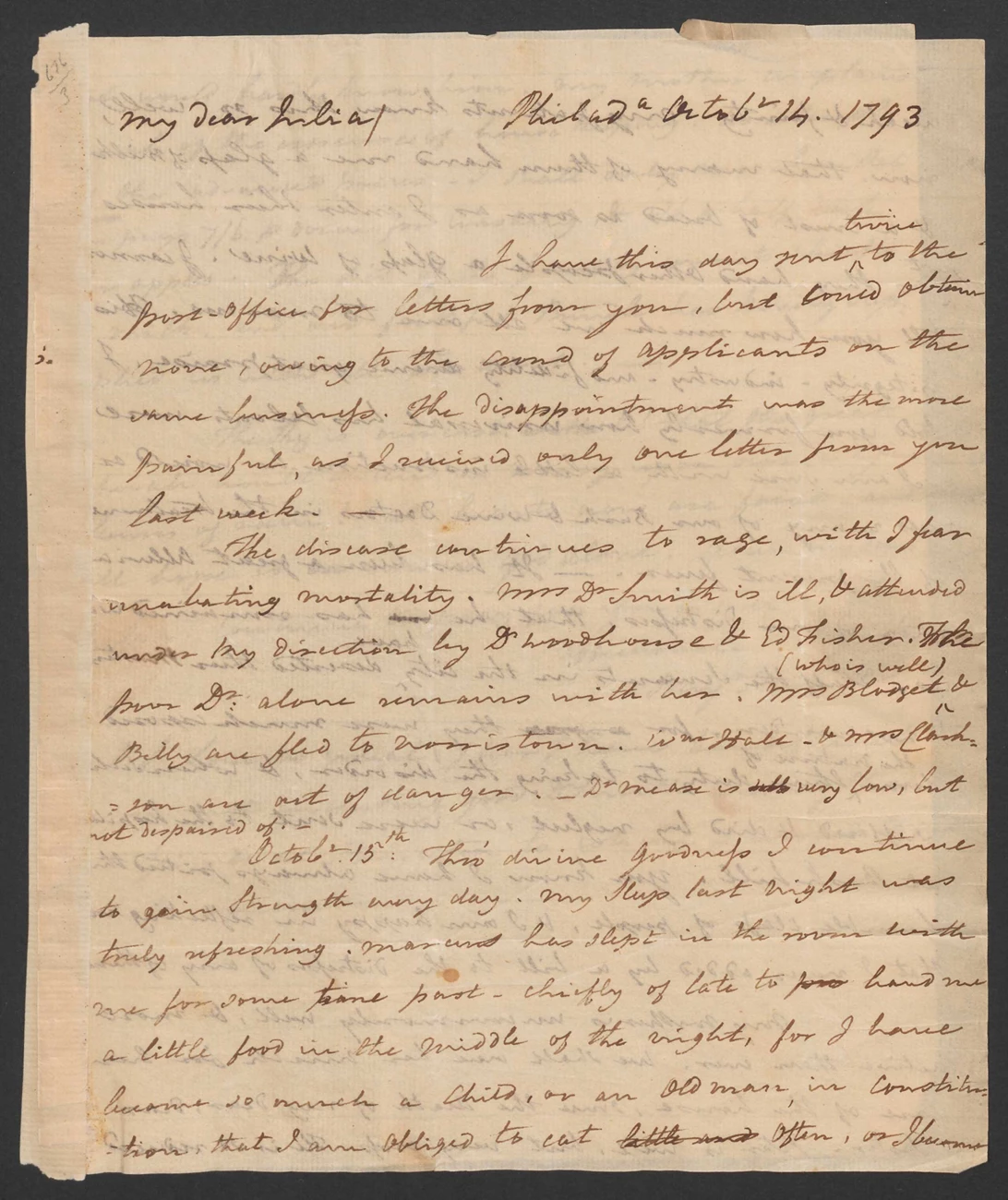Last updated: July 29, 2025
Article
Marcus Marsh, Benjamin Rush, & the 1793 Yellow Fever Epidemic

Courtesy of Duke University Libraries, Repository - Collections & Archives.
Date: October 14 & 15, 1793
Location: Philadelphia, Pennsylvania
Object Information: Paper document, 3 p.
Repository: Duke University Libraries, Repository - Collections and Archives. “Benjamin Rush (Philadelphia) letter to Julia Stockton Rush (Princeton [N.J.]), 1793 October 14-15” in Benjamin and Julia Stockton Rush papers, bulk 1766-1845.
Description:
This is a letter Dr. Benjamin Rush wrote to his wife Julia during the height of the 1793 yellow fever epidemic in Philadelphia. In it, he describes the critical role of Marcus Marsh, a twenty-eight-year-old formerly enslaved domestic servant, who lived and worked in the Rush home at 3rd and Walnut Streets, now the site of the Bicentennial Bell in the Benjamin Rush Garden. In the letter Dr. Rush wrote:
I cannot tell you how much we all owe to Marcus. His integrity, industry, and fidelity deserve great praise. I told you formerly how universal his talents were. I am sure with a little instruction he would exceed many of our bark and wine doctors in the treatment of the present fever. It has been a great alleviation of our distress that he has remained with us.
Marsh was among the many unnamed individuals praised by Richard Allen and Absalom Jones in A Refutation, which highlighted the vital contributions of African Americans during the epidemic—contributions largely overlooked by writers like Mathew Carey. After the epidemic, Marsh likely continued to develop his medical skills before becoming a seaman in 1798 at the age of 33.Pages of the 1793 Letter
Click on the images below to see full-size versions. Courtesy of the Duke University Libraries, Repository - Collections and Archives.
Page 1
My dear Julia,
Philadelphia, October 14, 1793
I have this day sent twice to the post office for letters from you, but could obtain none, owing to the crowd of applicants on the same business. The disappointment was the more painful as I received only one letter from you last week.
The disease continues to rage, with I fear unabating mortality. Mrs. Dr. Smith is ill and attended under my direction by Dr. Wood-house and Ed Fisher. The poor Doctor alone remains with her. Mrs. Blodgett (who is well) and Billy are fled to Norristown. Wm. Hall and Mrs. Clarkson are out of danger. Dr. Mease is very low but not despaired of.
October 15th. Through divine goodness I continue to gain strength every day. My sleep last night was truly refreshing. Marcus has slept in the room with me for some time past, chiefly of late to hand me a little food in the middle of the night, for I have become so much a child, or an old man, in constitution that I am obliged to eat often or I become
Page 2
weak and fainty. My patients know this so well now that many of them hand me a glass of milk and a crust of bread as soon as I enter their houses, just as they hand other people a glass of wine. I cannot tell you how much we all owe to Marcus. His integrity, industry, and fidelity deserve great praise. I told you formerly how universal his talents were. I am sure with a little instruction he would exceed many of our bark and wine doctors in the treatment of the present fever. It has been a great alleviation of our distress that he has remained with us. Half the servants in the city have deserted their masters, and no wonder, for they were much exposed from the nature of their duty to taking the disorder, and when sick suffered and died by neglect or were sent to the hospital at Bush hill. You know I have always pitied this humble class of people, and I am happy in reflecting now that I never added by a bill to the distresses of any of them.
My mother is uncommonly well and more active than ever. We shall owe her much for her care of the house since the death of my dear, dear sister. Peter is well but very cross. He is so reduced
Page 3
that [you] would hardly know him. My mother complains much of the expenses of housekeeping. As a sample of the advanced prices, I shall only mention that she pays 7/6 per dozen for washing & 2/6 a half peck for apples. The diet of the family consists chiefly of milk, and our faithful Brindle has kindly supplied us with all we want.
The sky is overcast. O! that the great Jehovah would descend in mercy upon our city in showers of rain! All hearts now are faint, and all hope is now in God alone. Adieu, my dear Julia. Continue to pray for your ever affectionate
Benjn Rush
P.S. Love as usual. I fear I have been deficient in not including good Dr. Smith among the friends at Princeton to whom I wished to be remembered.
Addressed: Mrs Julia Rush at Richd Stockton’s Esqr: Princeton.
MS: Josiah C. Trent, M.D., Durham, North Carolina.



